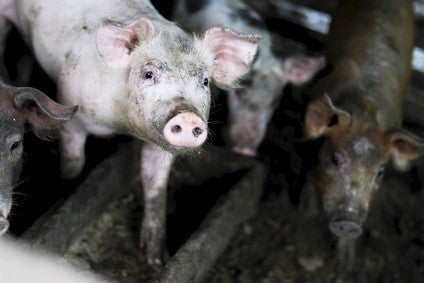
The discovery of "superbug" MRSA in pork on sale in several UK supermarkets has prompted renewed calls for the food sector to change the way it uses antibiotics in meat production.
A study published today (18 June) by The Guardian found pork from Denmark and Ireland on sale in Tesco, Asda, Sainsbury's and The Co-operative Group stores contained MRSA of livestock origin.

Discover B2B Marketing That Performs
Combine business intelligence and editorial excellence to reach engaged professionals across 36 leading media platforms.
Meanwhile, the Alliance to Save Our Antibiotics – a coalition of health, medical, animal welfare and NGO organisations that includes organic group The Soil Association – said that livestock-associated MRSA has for the "first time" been detected in British reared pork.
The Alliance said UK consumers are being exposed to MRSA in pork and stressed that a person eating pork twice a week "may be" consuming contaminated meat once in every three months.
"Antibiotic resistance is predicted to cause one million deaths across Europe by 2025. This discovery is the latest warning that overuse of antibiotics on farms is posing a risk to human health," the Alliance argued.
The overuse of antibiotics in areas such as meat production encourages the development of so-called "superbugs" – drug-resistant bacteria like MRSA. Around 45% of the antibiotics used in the UK are used in meat production.

US Tariffs are shifting - will you react or anticipate?
Don’t let policy changes catch you off guard. Stay proactive with real-time data and expert analysis.
By GlobalDataA growing body of evidence has prompted calls for the food industry to cut its reliance on antibiotics that are crutically important for human health. In a recent report, the World Health Organization suggested curbing the use of antibiotics in meat production. The WHO called for measures to "reduce the overuse and misuse of antimicrobials in food animals for the protection of human health".
According to the Alliance to Save Our Antibiotics, other European countries have responded to the spread of MRSA through their pig herds by introducing direct testing of pigs. The Alliance called on the UK government to introduce similar measures. "Without decisive and immediate action to address antibiotic use on farms, it is now very likely that MRSA will spread quickly throughout the UK pig herd – and into the pork we eat."
According to the UK's Department for Environment, Food and Rural Affairs, livestock-associated MRSA is not the same as MRSA strains that can cause healthcare-associated infections. The Food Standards Agency advises that if meat is handled and prepared properly, the risk to people is extremely low.
Responding to the findings, a Co-operative spokesperson said: "Customer safety is our absolute priority. The UK Food Standards Agency says there are no known cases of people contracting MRSA from eating meat in the UK. We are investigating the findings with our Danish bacon supplier, who is at the forefront of research into (LA) MRSA"
A spokesperson for Tesco also stressed the safety of its products. "Providing safe food is always our absolute priority. We work closely with our suppliers to ensure that our strict food safety and stringent quality checks and procedures, which are to the standards of those required by the Red Tractor Scheme, are met on all our pork products," the spokesperson commented.
A spokesperson for Sainsbury's added: "We routinely test our own products for a range of microorganisms and take advice from all the relevant authorities. We are not aware of any threat to human health from MRSA CC398 through food products, and any presence on a meat product would be eliminated through cooking."
Asda did not respond to requests for comment.
The issue of antibiotics in meat production has gained growing recognition as a result of a jump in awareness. For out take on why the industry must act now to reduce antibiotic usage, click here.





